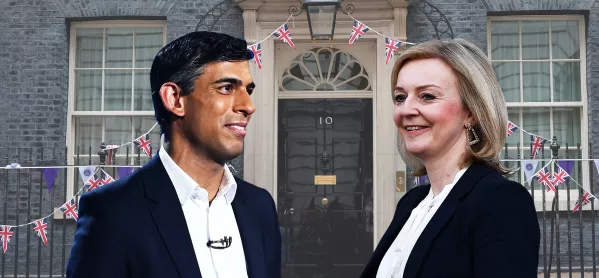Truss or Sunak: What either new PM could mean for education

Discussion about education has been almost entirely absent from the race to be next Conservative leader and prime minister.
In many ways, this is a positive as, not so long ago, bemoaning the poor standards in comprehensives would have been catnip to Tory members.
But the reputation of state schools has improved hugely in recent years. It would seem odd, even to this unusual electorate, to berate them.
But it’s also frustrating to see an issue of such importance sidelined.
And it’s annoying that one of the few policy pledges has been Liz Truss’ commitment to end the ban on grammar schools - which is just about the most unhelpful thing anyone could do at the moment. It indicates how low a priority schools and colleges are for the government right now.
Nevertheless, whoever wins will have to engage in this area, so what might we expect from prime minister Sunak or Truss after the race is done?
Sunak: Funding and skills
Sunak has shown very little interest in anything other than economics during his time in Parliament. As chancellor, he seemed determined to avoid spending money on schools.
When Sir Kevan Collins proposed his £15 billion Covid recovery plan, it was the former chancellor who blocked it. Boris Johnson had signed off on an announcement but was persuaded out of it at the last minute by Sunak, who’d turned up at No 10 with a pizza after all the officials had gone home.
He has more interest in the skills agenda, which he sees as having a direct link to economic growth. The one programme that he initiated was Multiply, the aim of which is to help adults without maths qualifications.
My guess is that if he becomes PM, he will ask his secretary of state to focus on post-16 as part of a general cross-government push for growth.
And there will be no chance of any additional funding for schools to cover the recently announced pay increases, meaning that - taking inflation into account - per pupil cash will remain well below where it was in 2010.
Truss: Maths and childcare
Liz Truss, on the other hand, is very interested in education, which could be a blessing or a curse.
She was a junior minister at the Department for Education (DfE) between 2012 and 2014, where she was responsible for an unusual mix of policy areas, including early years and secondary assessment.
On the topic of childcare, she was extremely keen on deregulation, believing that the high costs of English nurseries are due to the tight adult:child ratio required and the “bureaucratic” early years foundation stage.
I expect she’d move again on that fairly quickly, going beyond the current, reasonably mild, consultation on ratios, to the dismay of those in the sector.
On school-age education, she is obsessed with maths.
As can be seen from her comments during the race about her own education at Roundhay School in Leeds, she thinks she was taught the subject poorly, and that many pupils are still taught it poorly. (As an aside, it’s dispiriting that the person who would be the first ever prime minister to be educated at a comprehensive school is so scathing about the institution that helped her to the University of Oxford and the Cabinet).
I suspect we would see a push to make maths compulsory to 18 if she became prime minister, though who knows how we’d recruit enough teachers to enable that to happen, given current difficulties.
She will certainly be looking to increase take-up and incentivise the study of maths at every opportunity. As for grammar schools, one can only hope she is pandering temporarily to ageing Tory members and that sense would prevail should she win.
The evidence is absolutely rock solid that bringing them back would harm children from lower-income families, and the idea is deeply unpopular with parents.
School’s Bill dilemma
One big decision that whoever wins will have to take quickly is whether to carry on with the Schools Bill following its troubled progress through the House of Lords.
Most of its contents ended up being removed but the current intention is to reintroduce new clauses to replace what’s gone, in September.
There is pressure from parts of the party to scrap it altogether but, if that happens, then the White Paper would essentially be dead, and we’d once again be without any plan for how to turn the academies system into something coherent.
It would be the second White Paper in a row to be killed off by a sudden change in prime minister.
As ever, the quality of the ministerial team at the DfE will be of critical importance. One would hope that the laughable appointments of Andrea Jenkyns and Brendan Clarke-Smith as junior ministers are quickly overturned.
As for the secretary of state, it would be nice to have someone who was genuinely interested in education, rather than seeing the role as a stepping stone for their longer-term ambitions. Schools and colleges need someone who’ll fight their corner more than ever.
Sam Freedman is a former senior policy adviser at the Department for Education and a senior fellow at the Institute of Government
You need a Tes subscription to read this article
Subscribe now to read this article and get other subscriber-only content:
- Unlimited access to all Tes magazine content
- Exclusive subscriber-only stories
- Award-winning email newsletters
Already a subscriber? Log in
You need a subscription to read this article
Subscribe now to read this article and get other subscriber-only content, including:
- Unlimited access to all Tes magazine content
- Exclusive subscriber-only stories
- Award-winning email newsletters
topics in this article



